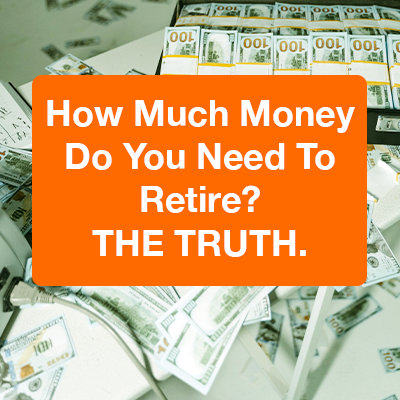One of our biggest expenses in this life is housing. “Should I buy or rent?” is one of the most commonly asked questions in the personal finance space.
In this post, I’ll talk about all the reasons why you should rent, and why buying a house to live in as an “investment” is a dumb myth.
NOTE: There’s an assumption in the analysis below, which is you do a downpayment of 20% or more. I personally don’t believe in doing PMIs because the risk is too high for my preference, so I don’t bother calculating for those cases. If you want to do a 3.5% down and risk your entire loan on the spread between market returns vs. loan returns, more power to you (and good luck) — but this article isn’t for you.
A House You Live In Isn’t Asset. It’s A Liability
You buy a house. You live in it. And you never sell it. How does this make you money again?
In Rich Dad Poor Dad, the author says that an asset is something that puts money in your pocket, while a liability is something that takes money out of your pocket.
Nevermind that the author didn’t actually have the 2 dads he claimed in the book and that he’s a total scammer with his network marketing: the lesson here holds true.
If you don’t sell your home, you never capture any money from it. This means you’re constantly paying expenses and capital expenditure just to maintain your house. This is strictly a liability because if you don’t plan to sell, you’re just spending money without ever putting money back into your pocket.
“But maybe I’ll sell someday if I buy instead of rent.” But selling “someday” isn’t an investment strategy last time I checked. Without a target exit price and knowing when you’ll capture the value for your house, you’re just guessing and hoping. Guessing and hoping isn’t investing, and so buying a house to live in isn’t an “investment.”
If you pick your dream house that you love and live in it, you’re likely to lose money. This is because it’s akin to picking a random house instead of looking at its growth or cash flow potential.
Suppose you randomly pick a house you ‘loved’ and bought it to rent it out to tenants. You’re going to lose money because it’s very hard to find a house that’ll cover your mortgage + operational costs + expenses. Thus, picking at random is not an investment. And even if you did your due diligence, it turns out there’s still a good chance things won’t work out with single family rentals.
Now suppose you picked a house you ‘loved’ and bought it so you can live in it. It’s like the above situation, except now you’re handicapped since you won’t collect rent at all. For your finances to work out, you’re basically picking a ‘rental’ property where:
- Your tenants live for free. And you’ll cover their utilities + capex + operating costs for years, if not decades.
- Even with this expense handicap, the house would need to appreciate enough to cover all the lost rent opportunity + expenses incurred over the years.
If you could do this, you’re very smart for picking a miracle property. But also extremely dumb because you could have just bought the property and leave it vacant. That way, you won’t have years of pent-up expenses to catch up on in the sale of the property.
But putting a ton of money down to buy a vacant property is insane. But what’s more insane is buying a house to live in (which is strictly worse) and believing that to somehow be an “investment.”
“Should I Buy Or Rent?” Depends On How You’ll Sell It
“Houses appreciate. It’ll increase in value. When I buy, I make the money. So I should just buy instead of rent then, right?”
Say your house appreciates. When you sell it, are you willing to downsize? If not, then where’s the profit? Last I checked, investments have some kind of profit associated with it. So if you can’t show me the profit, your house isn’t an investment.
- Example: Say you got a house for $200K and 20 years later you sell it for 1.2M. Where will you move to? Chances are, the market near you also appreciated. The only real way for you to capture a profit is to downsize significantly or move to another market entirely and abandon all your family and friends.
- Chances are you had no plans to downsize, and so you won’t get a profit.
But let’s say you have a 20-year plan with an exit target price and a downsizing plan, then sure, your house would be an investment.
Chances are though if you’re reading this, you haven’t thought about all these factors carefully. And if you haven’t thought about all the numbers and scenario carefully, then you’re just gambling with a ton of money when buying a house, not “investing.”
Never mistake your peers wanting you to believe something is an investment so they can justify their own purchases vs. a real investment.
House-Hacking
“Should I buy a house to house-hack, or should I rent?”
I’d say this is the most viable way to make your house an investment. And my answer is it depends if it’s a residential (4 or fewer units) or commercial (5 or more units).
- If residential, I’d say it doesn’t make a huge difference. I’d say it’s a wash, but leaning towards house-hacking. Suppose:
- Scenario 1 where you house-hack a 4-unit apt, with each unit charging $1500. You have an opportunity cost of $1500/mo since you live in one of the units.
- Scenario 2 is where you purchase a 4-unit apt as an investment property, with each unit charging $1500/mo. You also pay rent in another building at $1500/mo. You cancel out the last tenant’s income.
- The main advantage in scenario 1 is the loan. Since it’s a primary residence technically you can get a much lower down payment and better loan terms generally. This could make the difference between scenario 1 and 2. So you might consider house-hacking because of this.
- If commercial, I’d say to just rent and buy an investment property separately.
- Suppose the same 2 scenarios as above, except 5 units at $1500/mo instead.
- Recall that commercial properties are valued at their net operating income, or NOI.
- Assuming you’re already making a profit with the other 4 units, your extra $1500/mo = $18000/yr in NOI.
- If your market is trading at a crappy 10% cap rate, your real estate value is $180K more if you don’t house-hack it. If your market is trading at a more metropolitan 4% cap, your property is worth $450K more. Unless house-hacking can let you grab loans to outperform these kinds of gains, you shouldn’t house hack if you’re doing commercial.
Massive Opportunity Cost
Myth: “I’m just throwing money away if I rent because I’m not building equity, so I should just buy a house.”
Wrong. And every time someone says this I want to hit them in the face. Really hard. But now, I can just refer them to this post.
Fact: You’re throwing money away when you buy a home via massive financial opportunity costs.
Let’s take a look at one of my rental examples:
- Put down payment of $40K. +20K (+50%) profit over 4 years.
- This is terrible, because the S&P 500 went up 56% over the same period and owning that is a lot less headaches than owning a rental.
- Also, at the time of purchase I was deciding between this house vs. using down payment to buy stock in the company I worked at. It hurts me to say this, but if I used the down payment to buy the undervalued stock instead I’d have made +1000% instead.
- OK, but that’s short term. What about long-term? This house was worth $40K in Jan 1974, and is supposed to be worth $240K nowadays. So it 6X’d in 47 years. Compare to this to the S&P 500 which has 72X’d in the same timeframe.
“Wow, way to cherry-pick an example to prove a point. Can you give me a better example?”
My belief is that you’re most likely to make money in real estate if you were to buy more “A-Class” apartments in metropolitan areas.
- With Manhattan / Hong Kong apartments, you got 2.56X to 2.77X equity multiple over 20 years. The S&P 500 only got you a 2.27X multiple.
- With these numbers, you should definitely rent. But wait, why? The S&P 500 had less appreciation than the properties!
- This goes back to the ‘selling’ problem. Suppose your $500K apartment is now worth $1.385MM (2.77X) now. You sell it, then what? If you downsize, you’d need to downsize to a $692K apartment just to break even with S&P 500. The market you’re in likely has appreciated with your home, so what are you going to do, move to the hood?
- By the way, the $692K figure is calculated with (2.77X – 2.27X) * 1.385MM, which means I’m not even counting taxes. In reality, you’d need to downsize to a house much cheaper than $692K to breakeven with S&P 500.
- Note: Since you’re downsizing, you can’t use a 1031 exchange to get tax breaks.
- By the way, the $692K figure is calculated with (2.77X – 2.27X) * 1.385MM, which means I’m not even counting taxes. In reality, you’d need to downsize to a house much cheaper than $692K to breakeven with S&P 500.
- You can certainly downsize if you were to move out of a metropolitan area and to the middle of nowhere when you sell your place for $692K.
- People generally move “to the middle of nowhere” and away from a city when they start a family. Which means you’d buy the expensive apartment in a city, wait 20 years to sell, start a family, and downsize.
- The first paradox here is you’d need to downsize while “starting a family,” which doesn’t work.
- The second paradox here is even if you somehow executed this magical 2-decade plan, you’d have to be 10 years old when you bought the prime real estate.
Even if you can somehow crawl through those 2 huge paradoxes, this is just to *breakeven* with the S&P 500. All things equal, I’d just rather take the S&P 500 and have the option as I grow older to liquidate that money for a big house, or keep letting it compound.
You strictly get fewer options – both in your life, and financially – should you buy instead of rent.
“So I Should Buy, Not Rent?”
Yes, if you can’t read.
In sum, you should rent because:
- Buying a house is strictly a liability because most people won’t sell for a profit. It’s like buying a rental property and letting people live there for free.
- Massive financial opportunity cost of buying. Examples above looked at extremely good scenarios for real estate appreciation combined with massive downsizing, and you’re still breaking even with the S&P 500. Realistically, you’ll easily lose hundreds of thousands—if not millions—of dollars over decades from opportunity cost since you’re not realistically going to downsize.
After all this, if you want buy a house to live in, great.
Just realize it’s an enormous expense for you and your family to feel a sense of security. And it could be worth it for you.
But don’t fool yourself into thinking it’s a financial investment because it’s not. Fooling yourself into thinking buying a house is an investment will leave you making an uninformed, and big financial decision in your life. And last I checked: uninformed + lots of money = bad results.












Why is it that you don’t understand that there is a fatal flaw in your argument? Namely, that you have to live somewhere, and so if you don’t buy a house, you have to pay a lot more rent to buy the house than the zero – in your analysis – rent you have to pay when you own. And the money for that rent has to come from somewhere?
Now of course, the answer is that it’s not a priori certain which is better – buy vs rent – because it depends on so many factors, most of which are not knowable, not least of which is how much the house appreciates in nominal terms, and how much your money could grow in real-time terms over the same time period, and what interest rate you are on a mortgage loan.
You also neglect two fo the major plus factors in owning: the leverage you get from taking out a loan with only 0% – 20% equity down, and the fact that mortgage interest and property taxes are tax deductible. Again, this doesn’t guarantee that owning is superior, but in moderate, let alone high, inflation scenarios, the leverage provided by a fixed rate loan with 20% equity is substantial, and leads to very high returns on your investment in many cases. Especially if you are living in the same size home you would otherwise have rented.
Again, but vs rent is not clear cut. But making it seem clear cut by only showing half of the equation is… incomplete, at best.
I agree, to disagree. I don’t talk about total rental costs because it’s a sunk cost, not because it’s free. And if you can afford a down payment for a house, you have enough to pay rent is the assumption. This article just hopes to debunk the “given” scenario than buying > renting.
The money does come from somewhere — the enormous down payment. I assume no PMI because I don’t like loans with >80% LTV based partially on point 2 below. I’ll update the preface with a disclaimer.
On the 2 plus points:
1. You can in fact do high LTV loans and use that leverage to make more money. On this I agree. But I don’t agree on this risk based on the premise you stated which is I need a place to live. Suppose things go very poorly with my supposed spread = I’m homeless. And suppose I do nothing with that money — then that leverage is pointless. Making a spread on your mortgage loan is quite advantageous compared to margining on stocks because it’s much harder to get called (you just take the loan to a long position instead of a leveraged long position and you’ll never get called). So I agree with the theory here, but it’s my preference to not take black swan risks on having a place to live. So, I agree to disagree.
2. At 0-20% down sure you get great tax deductions. At the end of the tax season. So that’s great, you’ll get a tax refund at the end of the year so you can allocate it to pay for next year’s expenses. But not even. Say you deduct $30K from your income. You get $30K * marginal tax bracket back. For highest bracket, it’s like $15K. So you’re still incurring an extra $15K cost each year. I don’t really like these tax rebate arguments because it’s like saying ‘I’m only hemorrhaging blood, but I’m not dead yet so this is better than not bleeding at all!’ Also too if the tax deduction is *that significant* to your cash flow each year, then that means your expenses for the year (before you get your money back end of tax season) is also proportionally significant. This creates a lot of drag on your ability to invest. Money now to invest is worth a lot more than a year later (esp. in the high inflation scenarios you mention). Taxes should not be the sole (or even one of the main reasons) of investing IMO.
But my argument above isn’t meant to be complete: as a human being, I come with biases just like you. Hence the disclaimer that if ‘after all this, you still want to buy a house, great’. There are Maslow’s needs and many intangibles that might make something financially suboptimal but still OK to do. If you have 300 million sitting in the bank and you want to buy a $1 million house — it’s not optimal but who cares? There are of course situations to rent vs. buy. But don’t just take it for granted that buying is an ‘investment’ and is ‘cheaper than renting’ is my point, which is a common myth.
At the end of the day — it’s obvious buying a house works for some, but not all. I just don’t think it’s a good choice the vast majority of the time when my peers buy homes. They haven’t even thought about the points you or I have discussed. But if you want to buy a house after some critical thinking, go ahead and buy one. Buy 10 if you want.